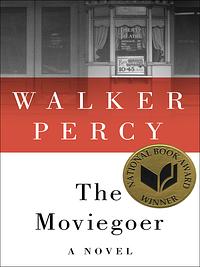Take a photo of a barcode or cover
A little dull, from what I remember. Maybe I missed something.
This novel mourns the unsustainability and peculiarity of the life of Binx, the narrator, who lives as a ridiculously rich stockbroker and a romantic who likes to think about stuff. I can't imagine why this would be a problem worth thinking about, and yet, for 242 pages, I was totally immersed in it. Binx's cruel disregard and selfishness, are, I suppose are meant to articulate a symptom of his peculiar double-life. Cue some kind of existential sympathy. But I just felt like I was in claustrophobic proximity with a sociopath. The novel certainly intends a claustrophobic feeling, but it's intended to allow us to sympathize with Binx. Far from sympathy, proximity to Binx's oblivious, privileged mournfulness alienated him from me.
It was like reading Lolita while being expected to sympathize with Humbert Humbert: ubless you're a pedophile, the novel doesn't really do much for you. With the Moviegoer, I'm not a straight, white male who thinks that his life is falling apart because he has a brain that works. So this novel doesn't really do much for me.
It was like reading Lolita while being expected to sympathize with Humbert Humbert: ubless you're a pedophile, the novel doesn't really do much for you. With the Moviegoer, I'm not a straight, white male who thinks that his life is falling apart because he has a brain that works. So this novel doesn't really do much for me.
challenging
medium-paced
Plot or Character Driven:
Character
Strong character development:
No
Loveable characters:
Complicated
Diverse cast of characters:
No
Flaws of characters a main focus:
Yes
The first time I read this book I was a grad student, nearly the same age as Binx Bolling, the protagonist of the novel. The Moviegoer was written in 1961 by an author who, it seems to me, had some critiques to make of modern American society. Binx is on the Big Search for meaning in his life. He dates his secretaries, he goes to the movies, he works as a stockbroker in New Orleans. Religion is in the background - he describes himself as a lapsed Catholic - but it is not a prominent feature of his life.
I suspect Percy sees this kind of life being led by a great many people, and tried to get inside the head of someone who just exists and looks around but doesn’t really live. To quote another philosopher, “the unexamined life is not worth living.” 20 years later I see that trap more clearly than I did before. How easy it is just to go through life doing one thing after another with little reflection or critical thought. This is a challenging story at the time - we are not meant to emulate the protagonist but to think critically about his choices for himself. And maybe reflect about ourselves.
I suspect Percy sees this kind of life being led by a great many people, and tried to get inside the head of someone who just exists and looks around but doesn’t really live. To quote another philosopher, “the unexamined life is not worth living.” 20 years later I see that trap more clearly than I did before. How easy it is just to go through life doing one thing after another with little reflection or critical thought. This is a challenging story at the time - we are not meant to emulate the protagonist but to think critically about his choices for himself. And maybe reflect about ourselves.
reflective
sad
slow-paced
Plot or Character Driven:
Character
Strong character development:
Complicated
Loveable characters:
No
Diverse cast of characters:
No
Flaws of characters a main focus:
Yes
A beautiful book in which very little happens but the narrator's voice is so captivating that you don't even notice. A fascinating examination of alienation in the modern world.
The interesting thing is that there is something rather meta about this novel. Binx walks around seeing aspects of the movies he loves in his daily life, and the films almost seem to be more real to him than his reality (which, to us as readers, is, of course, fiction). In this way, Binx tries to instill his life with meaning, but the reality of his world (and the future it/his heritage sets out for him) forces him to give up his search for the meaning of life and instead embrace something he never planned on embracing.
Percy looks to Kierkegaard for much of the philosophical influence of this novel, but, interestingly, there is not much of a happy ending for Binx.
Definitely a novel to re-read, as there is excellent depth of character and setting that can sometimes distract from the philosophical issues in the same way that women and pleasure distract Binx from his search.
Percy looks to Kierkegaard for much of the philosophical influence of this novel, but, interestingly, there is not much of a happy ending for Binx.
Definitely a novel to re-read, as there is excellent depth of character and setting that can sometimes distract from the philosophical issues in the same way that women and pleasure distract Binx from his search.
challenging
emotional
reflective
medium-paced
inspiring
reflective
sad
slow-paced
Plot or Character Driven:
Character
Strong character development:
Complicated
Loveable characters:
No
Diverse cast of characters:
No
Flaws of characters a main focus:
Yes
Hated the main character. Hated the racism and sexism.
This that Flannery O’Connor type sensibility to the South; it’s perfect; the atypical, mysterious, and unexpected are ready to disinter your malaise-ridden mind on every page. Reminds me of McInerney’s Big Lights or Moshfegh’s Year of Rest. You’ve never seen, quite like this, a character creating their own vocabulary in order to attempt survival in this postmodern world — where you’d have to close your eyes not to be depressed or anxious.
“We’re sinning! We’re succeeding! We’re human after all!”
“Nobody but a Southerner knows the wrenching rinsing sadness of the cities of the North.”
“I held springtime in my arms, the fullness of it and the rinsing sadness of it.”
“…his eyes crisscrossed by fatigue and by the sadness of these glimmering dawns.”
“In the gathering dusk the cemeteries look at first like cities.”
“Perhaps it is the gentle motion of the train with which we nod ever so slightly, yes, yes, yes.”
“The only difficulty was that though the universe had been disposed of, I myself was left over.”
“…feeling my father’s eye on me, I turned and saw what he required of me…and I, seeing in his eyes the terrible request, requiring from me his very life; I, through a child’s cool perversity or some atavistic recoil from an intimacy too intimate, turned him down, turned away, refused him what I knew I could not give.”
“To become aware of the possibility of the search is to be onto something. Not to be onto something is to be in despair.”
“People with stimulating hobbies suffer from the most noxious of despairs since they are tranquilized in their despair. I muse along as quietly as a ghost. Instead of trying to sleep I try to fathom the mystery of this suburb at dawn. Why do these splendid houses look so defeated at this hour of the day?”
“This is another thing about the world which is upsidedown: all the friendly and likable people seem dead to me; only the haters seem alive.”
“Losing hope is not so bad. There’s something worse: losing hope and hiding it from yourself.”
“Christians talk about the horror of sin, but they have overlooked something. They keep talking as if everyone were a great sinner, when the truth is that nowadays one is hardly up to it. There is very little sin in the depths of the malaise.”
“We’re sinning! We’re succeeding! We’re human after all!”
“Nobody but a Southerner knows the wrenching rinsing sadness of the cities of the North.”
“I held springtime in my arms, the fullness of it and the rinsing sadness of it.”
“…his eyes crisscrossed by fatigue and by the sadness of these glimmering dawns.”
“In the gathering dusk the cemeteries look at first like cities.”
“Perhaps it is the gentle motion of the train with which we nod ever so slightly, yes, yes, yes.”
“The only difficulty was that though the universe had been disposed of, I myself was left over.”
“…feeling my father’s eye on me, I turned and saw what he required of me…and I, seeing in his eyes the terrible request, requiring from me his very life; I, through a child’s cool perversity or some atavistic recoil from an intimacy too intimate, turned him down, turned away, refused him what I knew I could not give.”
“To become aware of the possibility of the search is to be onto something. Not to be onto something is to be in despair.”
“People with stimulating hobbies suffer from the most noxious of despairs since they are tranquilized in their despair. I muse along as quietly as a ghost. Instead of trying to sleep I try to fathom the mystery of this suburb at dawn. Why do these splendid houses look so defeated at this hour of the day?”
“This is another thing about the world which is upsidedown: all the friendly and likable people seem dead to me; only the haters seem alive.”
“Losing hope is not so bad. There’s something worse: losing hope and hiding it from yourself.”
“Christians talk about the horror of sin, but they have overlooked something. They keep talking as if everyone were a great sinner, when the truth is that nowadays one is hardly up to it. There is very little sin in the depths of the malaise.”




